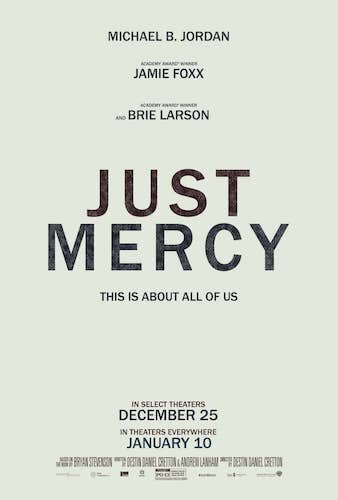Just Mercy
After Short Term 12 was a smash indie hit, Destin Daniel Cretton was one filmmaker many of us were itching to see return. The Glass Castle was a nice effort that fell a bit short (I feel it was a little under loved despite its flaws). With Just Mercy, Cretton has continued his attempts to supply voices to the silent. In Short Term 12, it was the youth of the world that are experiencing mental health and traumas. In The Glass Castle, we heard tales from a survivor of a family of squatters. Just Mercy speaks for the wrongfully convicted, especially those condemned to death on Death Row (and prisoners incarcerated due to racial profiling). Like The Glass Castle, Just Mercy is based on a real person: Walter McMillian, a father blamed for the murder of an eighteen year old woman he couldn’t possibly have committed.
I can’t say Just Mercy is overlong, because all of the scenes feel necessary to build up attorney Bryan Stevenson’s case to clear McMillian’s name. The real story was a circulated phenomenon because of a 60 Minutes piece that presented the case’s injustices across the country. Just Mercy barely focuses on that, but I think I know why. Cretton is allowing the film to speak on behalf of what we don’t know, thus making the film about Stevenson’s hard work to help an innocent man, and also about the actual man behind the news piece. It’s a nice touch that goes a long way. Plus, it helps us focus on particular individuals. Michael B. Jordan delivers a commanding lead performance as Stevenson, with Jamie Foxx’s acclaimed supporting role (McMillian) stealing every scene that he is in. Supporting roles include a solid turn by Brie Larson (a favourite performer of Cretton to work with), and a fantastic role by Tim Blake Nelson.
McMillian waiting to hear his verdict, with attorney Stevenson alongside him.
Just Mercy has the right intentions, which are proven true by the ending title cards (where you can see how the film attempted to speak for more than just one person cursed by wrongful conviction). It’s hard to critique a film this important, that carries multiple messages that everyone needs to hear (even in 2020). With some slight tidying up, Just Mercy could have zeroed in on some of its points with a bit more of a punch (seeing as that is exactly the kind of impact the film is going for), but none of the actual content should be removed. It feels like much of the film tip-toes around moments in the fight for a retrial, which elongates scenes, removes the strength of these moments, and maybe spoon feeds why these are crucial matters to see to its audience. Maybe Just Mercy was catered for the awards season, in a way that all audiences can nod in agreement. It could have done with Short Term 12’s blatant realism, which is obviously something Cretton has experience in. Ah well. The end result of Just Mercy is a relevant call for action with pure purposes, that won’t hurt to try. That’s slightly the problem. Just Mercy deserves to have all of the bite, especially for what it stands for and the urgency of this kind of story needing to be heard.
Andreas Babiolakis has a Masters degree in Film and Photography Preservation and Collections Management from Ryerson University, as well as a Bachelors degree in Cinema Studies from York University. His favourite times of year are the Criterion Collection flash sales and the annual Toronto International Film Festival.





